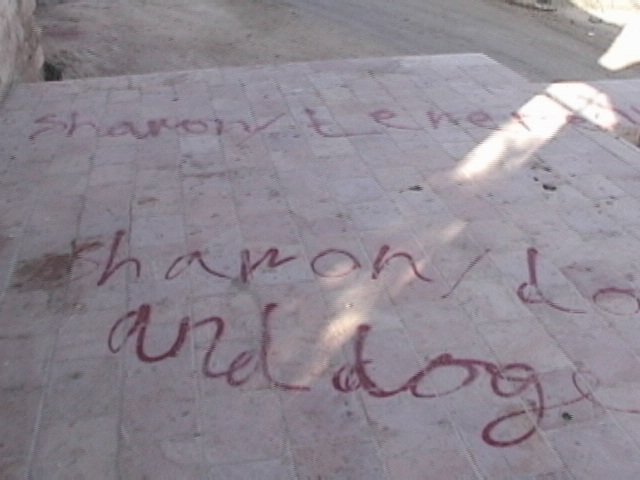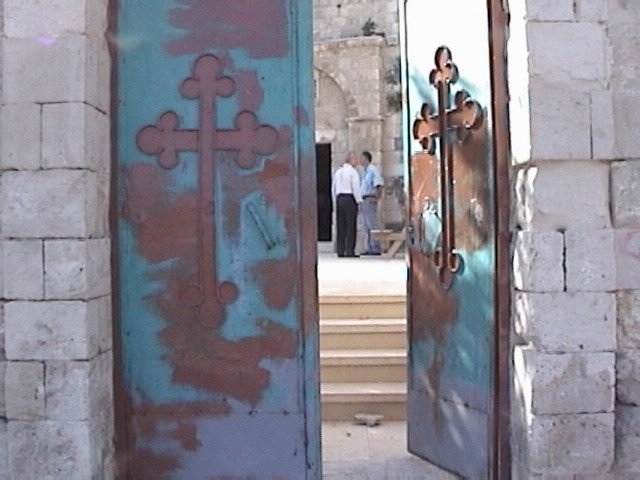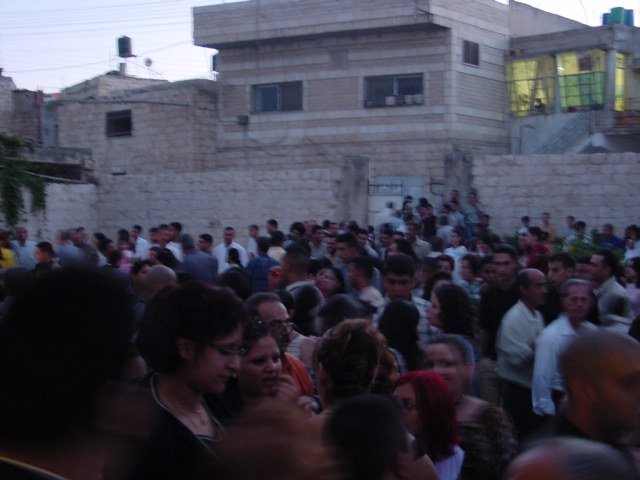September 14, 2002
The Byzantine liturgy in the Burqin church.
Several members of the Orthodox community headed up with Fr. Thomas today to the church in Burqin (to the West of Jenin). Burqin is one of our favorite sites, the purported fourth oldest site of Christian veneration in the world, the believed site of Christ's healing of the Ten Lepers (Luke 17). For twelve years, Fr. Thomas has shared responsibility for this community with two other priests - one in Beit Sahour, one in Jerusalem. For the last two years, neither of them has (or has been able) to come, leaving Fr. Thomas effectively responsible for three parishes - Zababdeh, Tubas, and Burqin. Balancing these is a trick, so Zababdeh worships on Sunday, Tubas on Friday, and now Burqin on Saturday.
Anti-Israeli graffiti outside the Burqin church.
The place was newly cleaned up for Christmas 2000, but in the past several months local vandals have turned their attention to it - the newly-tiled staircase has been busted up, anti-Israeli (stars of David, comments on Sharon) graffiti has been scrawled across the ground and wall outside the church. It seems aimed at singling out the minority Christian community here, but the anti-Israeli bit is strange - and not a little bit disturbing. No doubt that praying on Saturday contributes to it. Hopefully things will get sorted out. Burqin has always prided itself on good relations between its majority Muslim and minority Christian populations.
The Burqin church door.
The Byzantine liturgy is other-worldly, and the chorus - who play a key role in said liturgy - was largely made up of folks from Zababdeh's congregation who know it inside and out.
The village gathered outside Zababdeh’s Anglican church for the celebration.
In the afternoon, we heard the bells at the Anglican church ringing out - something we haven't heard in months! Indeed, Fr. Hossam had arrived from Nablus to perform a scheduled wedding. He had to take an ambulance to the edge of Nablus and then walk down a steep hill of debris (which used to be a road) to get a taxi on the other side of Nablus. The curfew there has been going on for three months - not only has he been unable to arrive in Zababdeh to pray, he hasn't even been able to lead worship in Nablus. Unlike the curfew in Jenin, the curfew in Nablus is very tight, and people really cannot go out except for specific liftings of the curfew, which last perhaps a day, usually a few hours. That, or use an ambulance. Every Sunday, he worships with his wife and the Orthodox family who help take care of the church compound. Nevertheless, we were able to celebrate - however subdued - a wedding in Zababdeh. Marthame joined with Fr. Hossam, Fr. Aktham, and Deacon Firas for some conversation and collegiality after the ceremony. Ecumenism at work.




